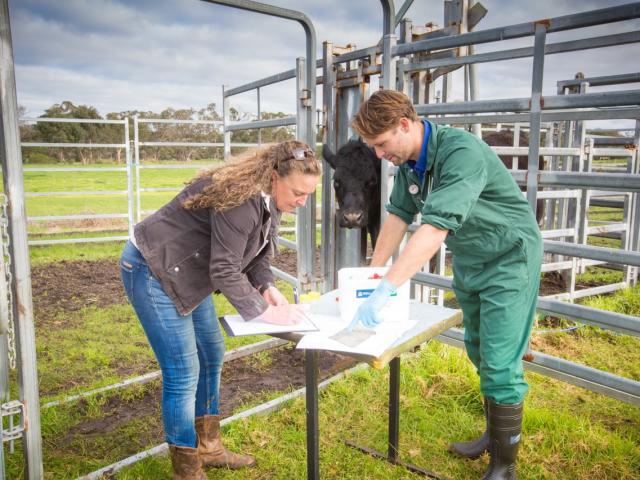SMS for cattle health in Great Southern

An innovative cattle surveillance network in the Great Southern that uses SMS technology has attracted more than 150 cattle producers as well as the support of cattle vets and stock agents.
Department of Primary Industries and Regional Development (DPIRD) field vet Andrew Larkins and industry advocate Sheena Smith are coordinating the pilot project, which will initially run until April 2019.
Dr Larkins said the network provided local producers in the shires of shires of Albany, Denmark and Plantagenet with a simple way of contributing to and accessing the latest data on cattle health in the region.
“The aim of the network is to provide local producers with up-to-date information about syndromes occurring in cattle in the region, while also strengthening WA’s ability to detect new, emerging or exotic diseases more rapidly,” Dr Larkins said.
“Western Australia’s reputation for producing healthy cattle is based on a biosecurity system that demonstrates to a scientific standard that our stock are fit to trade.
“The data collected during the Great Southern Cattle Surveillance Network pilot will strengthen market access for WA cattle and cattle products while also giving valuable feedback to producers in the form of local information on causes of illness.”
How the network works
Dr Larkins said network members participate in a short series of SMS text messages each fortnight asking if they have seen any signs of illness in their cattle.
“They then receive monthly reports outlining cattle illnesses that have been occurring in the area, what the common causes were and options for prevention and management,” Dr Larkins said.
“The monthly reports provided by DPIRD are a chance for producers to see what cattle health issues have been occurring in their region as a whole and compare that to what is going on at home. This information enables producers to assess their biosecurity measures and protect their herd.
“Members who report signs of illness in their cattle can request a follow-up phone call from DPIRD. The purpose of the call is to learn more about the case and discuss what support DPIRD may be able provide. This might include services such as subsidised disease investigations and post-mortem sampling to obtain a definite diagnosis or it may be to refer them to their local private vet for assistance.”
Producer feedback on the network
Local beef producer Eric Dobbe, who has been using the network since August, said that he had found the SMS process very easy to use.
“The SMS message acts as a good prompt to think about the past fortnight’s livestock activity. The monthly reports give you a good idea about cattle health in the area and where you can find more information for anything you might be concerned about,” Mr Dobbe said.
Producer Bonnie Ravenhill has also been using the network on her dairy in Narrikup and sees the network as an important tool for their business.
“It’s crucial to stay on top of the biosecurity risks that are around you. The network allows us to look at local information across a range of producers without singling anyone out. It means that we can look to adapt our plans to make sure we’re covered against the highest risks,” Mrs Ravenhill said.
“On top of that, if we do have an issue, we are better informed about the likely diagnosis. Together with our vet, we can then make quicker and better decisions.”
See Albany beef producer Sandy Lyon's feedback on the network in this short video.
Local stock agents have also supported the pilot project, saying they see it as a good opportunity to stay up to date with the latest on cattle health and have been discussing the benefits of the network with their clients.
The project has been jointly funded by DPIRD and the federal Department of Agriculture and Water Resources and will initially run until April 2019.
For more information or to register, see the DPIRD website or contact:
DPIRD vet Andrew Larkins, Andrew.larkins@dpird.wa.gov.au or +61 (0)8 9892 8530 or
Narrikup beef producer and ag event coordinator Sheena Smith, csngreatsouthern@gmail.com or +61 (0)427 214 707.
